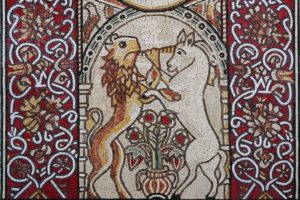Of all the cities, towns and places of note in the Stick of Joseph, none plays a greater and more central role than the capital city of Zerach’mla (Zarahemla in the 1830 Edition). Because this place holds such a central role in the text, and also has such a unique history, it’s worth considering the city’s unique name and its potential meaning.
It appears the name of this city is a compound of two Aramaic words: Z’ra (זרע) and Kh’mal (חמל) with an Aramaic “-a” ending.
Z’ra is an Aramaic word (very similar to the Hebrew zera`) that means “seed” and is also used to refer to that which is “scattered or dispersed” (as seed is scattered). The word is specifically used to describe Israel as the “scattered” in the Aramaic Peshitta versions of the New Testament:
James, a servant of Elohim and of the Adon Yeshua the Mashiach to the twelve tribes that are scattered [זרע] among the nations: Shalom.
(James 1:1)
Peter, an emissary of Yeshua the Mashiach to the chosen and sojourners who are scattered [זרע] in Pontus and in Galatia and in Cappadocia and in Asia and in Bithynia,
(1 Peter 1:1)
The Aramaic word Kh’mal means “did gather” (as grain into the barn)” as we read in the Aramaic Peshitta New Testament:
Look at the bird in the sky, which does not sow (scatter) [זרע] nor reap and does not gather [חמל] into storehouses, yet your father who is in heaven feeds them. Are you not more important than they?
(Matt. 6:26)
And he thought within himself and said, What shall I do because I have no place where I can gather [חמל] in my crops.
(Luke 12:17)
The root חמל may be related to the Aramaic/Hebrew root חמר “To boil up. To ferment, to pile up” from which we get the Hebrew word Khomer, a measure of grain or dry goods (Lev. 27:16; Num. 11:32; Ezek. 45:11, 13, 14)
The ל may have replaced the ר based on Egyptian influence. Because the “L” phoneme did not exist in the ancient Egyptian language, the “R” phoneme was substituted when Hebrew and Aramaic words were written in Ancient Egyptian, and ancient Egyptians would have pronounced such words with an “r” rather than “l” sound. This same interchangeability occurs in the Nephite word “Gazalem” (Alma 17:12) which likely comes from Hebrew Gazerim (גזרים) from the root גזר “to determine” and is used in Dan. 2:27; 4:7; 5:7 and 5:11 where the KJV has “soothsayers”)
Thus the name Zerach’mla likely means something similar to “The scattered ones are gathered in” with the imagery of seed that has been harvested being gathered into the barn.
This was a very appropriate name for this Stick of Joseph city, because it turned out to be the gathering point of many different peoples that had been scattered, including at least two distinct branches of scattered Israel that fled Jerusalem ahead of the Babylonian destruction.
There is no way that Yosef ben Yosef could have known these ancient Aramaic words and roots, so as to construct this very appropriate compound Aramaic name meaning that the scattered ones are gathered in—proving once again that the Stick of Joseph is, after all, an authentic Jewish record.
And now for an enticing question: Why did this ancient city on the American continent, populated by refugees from Jerusalem, have an Aramaic rather than a Hebrew name? I’ll consider this question in a future blog.






Leave a Reply